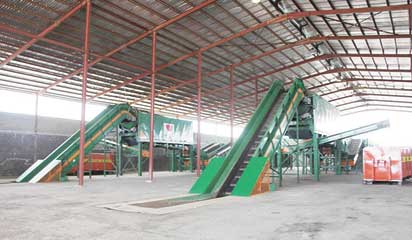One of the environmental problems confronting developing countries is inadequate waste management system particularly in urban centres with huge population and the most common means to dispose of the waste is through landfill.

Because of its nature, landfill leads to the conversion of the organic waste to biogas, containing about 50 per cent methane, a very active greenhouse gas that leads to global warming.
In Lagos, Nigeria for instance with a population of more than 17 million and daily waste generation of 11,000 metric tonnes, waste is dispose at landfill sites located across the metropolis particularly in Olushosun, Solus I and II, among others.
But the introduction of a Material Recovery Facility (MRF) recently by the Lagos State government and West Africa Energy Company, many believe, will further assist the state to reduce its carbon foot print through the MRF.
MRF, according to Wikipedia, is a specialised plant that receives, separates and prepares recyclable materials for marketing to end-user manufacturers.
The facility, the first of its kind in Nigeria, was built on closed Solous I dumpsite along the LASU-Iyana Iba Road, Igando in Alimosho Local Government Area of the state under a Public Private Partnership (PPP) arrangement of Built, Operate, Manage and Transfer – with a 12-year tenure at a total cost of N1.3 billion.
Conceived in 2012, the facility has the capacity to receive about 130 waste trucks per day and compress more than 2,000 metric tonnes of waste out of the 11,000 tonnes generated per day.
Essentially, the MRF is expected to provide support to the manufacturing sector through the provision of waste off-takers such as plastics, papers, metals and others that may lead to reduction in cost of production and generation of employment.
Part of the long term projection of the deal is to expand the factory to usher in its next phase where more refuse will be needed in order to produce heat for electricity generation while the third phase would be compositing and the production of fertilizer to maintain lawns, parks, gardens and other green areas across the city.
Former Governor of Lagos State, Mr. Babatunde Fashola, disclosed that the facility’s function was to recover solid waste materials, recycle them for reuse and conservation, adding that, in doing so, Lagos was only joining the rest of the world by having the recovery facility.
He went further, “The whole world is recycling, the whole world is reusing, the whole world is conserving. So nothing really goes to waste in any significant proportion. So that is what we are signing on, we are joining the whole world by having this recovery facility to recycle our wastes and turn them into wealth.
“So from a state that could not manage refuse, we have moved to a state that needs refuse,” he said.
The Chief Executive Officer, West Africa Energy Group, Mr. Paul O’Callaghan, while giving a brief on the project, said that the site where the facility was built used to be a borrow pit where piles of waste were dumped.
“It is our mission at West Africa ENRG that in partnership with Lagos State and the people of Lagos, that by 2020, zero waste will go to the landfill, helping to make Lagos the truly beautiful city that it is,” he said.
Mr. O’Callaghan stated that the facility would process more than 2,000 metric tonnes of waste per day and added that the staff strength sourced from the local community would increase from 120 to 350 skilled and unskilled workers.
He explained that the idea of the factory was conceived in 2012, adding that from then till now the idea has been turned into a factory that has the capacity to take 130 Private Sector Participation (PSP) compactor truckloads of refuse employing over 120 people at the first phase with the prospect to employ 300 in the later phases.
Executive Director, Sustainable Research and Action for Environmental Development (SRADev Nigeria), Leslie Adogame, said the compression to bails is in form of one product only before reuse, then it is a sound method environmentally.
Former Environment Commissioner in the state, Mr. Tunji Bello, said that the establishment of the resource recovery facility was a demonstration of the state government’s resolve to foster a clean, healthy and sustainable environment for the wellbeing of the citizenry.
Bello commended LAWMA and West Africa Energy for the laudable project, which he said would be a reference point in solid waste management in the country. He further revealed that the MRF, when fully operational, “is expected to provide support to the manufacturing sector through the provision of waste off-takers such as plastics, papers, metals etc, leading to reduction in cost of production and generation of employment to our teaming youths”.
He equally highlighted the importance of the MRF in the recently adopted policy on climate change adaptation and mitigation plan of the state. This, he said, would be achieved through the reduction in the carbon footprint of the state.
By Kayode Aboyeji
